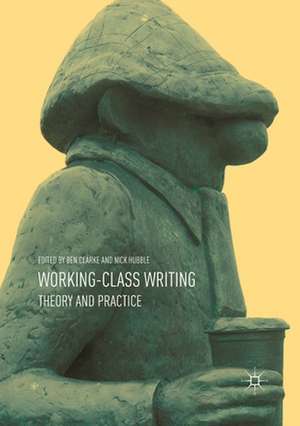Working-Class Writing: Theory and Practice
Editat de Ben Clarke, Nick Hubbleen Limba Engleză Paperback – 12 dec 2019
| Toate formatele și edițiile | Preț | Express |
|---|---|---|
| Paperback (1) | 582.45 lei 43-57 zile | |
| Springer – 12 dec 2019 | 582.45 lei 43-57 zile | |
| Hardback (1) | 784.92 lei 43-57 zile | |
| Springer International Publishing – 28 noi 2018 | 784.92 lei 43-57 zile |
Preț: 582.45 lei
Preț vechi: 685.23 lei
-15% Nou
Puncte Express: 874
Preț estimativ în valută:
111.45€ • 116.66$ • 92.76£
111.45€ • 116.66$ • 92.76£
Carte tipărită la comandă
Livrare economică 31 martie-14 aprilie
Preluare comenzi: 021 569.72.76
Specificații
ISBN-13: 9783030404628
ISBN-10: 3030404625
Pagini: 298
Dimensiuni: 155 x 235 x 19 mm
Greutate: 0.38 kg
Ediția:1st ed. 2018
Editura: Springer
Colecția Palgrave Macmillan
Locul publicării:Cham, Switzerland
ISBN-10: 3030404625
Pagini: 298
Dimensiuni: 155 x 235 x 19 mm
Greutate: 0.38 kg
Ediția:1st ed. 2018
Editura: Springer
Colecția Palgrave Macmillan
Locul publicării:Cham, Switzerland
Cuprins
1.
Working-Class
Writing
and
Experimentation
-
Ben
Clarke.-
2.
Interwoven
Histories:
Working
Class
Literature
&
Theory
-
Jack
Windle.-
3.
Meaning
It:
Everyday
Hermeneutics
and
the
Language
of
Class
in
Literary
Scholarship
-
Cassandra
Falke.-
4.
Kings
in
Disguise
and
'Pure
Ellen
Kellond':
Literary
Social
Passing
in
the
Early
Twentieth
Century
-
Luke
Seaber.-
5.
Democratic
Art
or
Working-Class
Literature?
Virginia
Woolf,
the
Women's
Cooperative
Guild
and
Literary
Value
in
the
'Introductory
Letter'
-
Natasha
Periyan.-
6.
The
Bakhtin
Circle
in
Caribbean
London:
Race,
Class
and
Narrative
Strategy
-
Matti
Ron.-
7.
'Look
at
the
State
of
this
Place!':
The
Impact
of
Domestic
Space
on
Post-War
Class
Consciousness
-
Simon
Lee.-
8.
Ethel
Carnie
Holdsworth'sHelen
of
Four
Gates:
Recasting
Melodrama
in
Novel
and
Cinematic
Form
-
Pamela
Fox.-
9.
Representation
of
the
Working
Classes
of
the
British
Colonies
and/as
the
Subalterns
in
Mulk
Raj
Anand'sCoolie -
Sabujkoli
Bandopadhyay.-
10.
London
Jewish...
and
Working-Class?
Social
and
Geographic
Mobility
in
Simon
Blumenfeld
and
Alexander
Baron
-
Jason
Finch.-
11.
The
Deindustrialist
Novel:
Twenty-first
Century
British
fiction
and
the
Working
Class
-
Phil
O'Brien.-
12.
Working-Class
Heritage
Revisited
in
Alan
Warner'sThe
Deadman's
Pedal-
Peter
Clandfield.-
13.
Respectability,
Nostalgia
and
Shame
in
Contemporary
English
Working-Class
Fiction
-
Nick
Hubble.
Notă biografică
Ben
Clarkeis Associate
Professor
of
Post-1900
British
Literature
at
the
University
of
North
Carolina,
Greensboro,
USA.
He
is
author
ofOrwell
in
Context(2007)
and
co-author
ofUnderstanding
Richard
Hoggart(2011).
He
has
published
on
subjects
including
public
house
and
mining
communities,
and
authors
including
Jack
Hilton,
H.
G.
Wells,
Edward
Upward,
and
Virginia
Woolf.
Nick Hubbleis Reader in English at Brunel University London, UK and the author ofMass Observation and Everyday Life(2006) andThe Proletarian Answer to the Modernist Question(2017).
Nick Hubbleis Reader in English at Brunel University London, UK and the author ofMass Observation and Everyday Life(2006) andThe Proletarian Answer to the Modernist Question(2017).
Caracteristici
There
has
been
a
significant
rise
in
interest
in
working-class
fiction
over
the
last
decade
but
most
of
the
key
critical
works
on
the
topic
date
from
the
late
1980s
to
mid-1990s
-
this
collection
rethinks
issues
relating
to
working
class
fiction
and
the
critical
work
relating
to
it
Examines
a
broad
range
of
writers,
from
Woolf
to
Orwell
Argues
for
a
heterogeneous
model
of
the
working
class
that
functions
as
a
strategic
rather
than
a
descriptive
term
and
is
always
mobilised
within
particular
historical
contexts
